 Reconceiving the Family
Reconceiving the Family Book contents
- Frontmatter
- Contents
- Acknowledgments
- Foreword, by Mary Ann Glendon
- List of Contributors
- Introduction
- PART ONE FAULT
- PART TWO CUSTODY
- PART THREE CHILD SUPPORT
- 6 Asymmetric Parenthood
- 7 Paying to Stay Home: On Competing Notions of Fairness and the Imputation of Income
- PART FOUR PROPERTY DIVISION
- PART FIVE SPOUSAL SUPPORT
- PART SIX DOMESTIC PARTNERSHIP
- PART SEVEN AGREEMENTS
- PART EIGHT JUDICIAL AND LEGISLATIVE PERSPECTIVES
- PART NINE INTERNATIONAL REFLECTIONS
- Afterword: Elite Principles: The ALI Proposals and the Politics of Law Reform, by Carl E. Schneider
- Index
6 - Asymmetric Parenthood
Published online by Cambridge University Press: 25 January 2010
- Frontmatter
- Contents
- Acknowledgments
- Foreword, by Mary Ann Glendon
- List of Contributors
- Introduction
- PART ONE FAULT
- PART TWO CUSTODY
- PART THREE CHILD SUPPORT
- 6 Asymmetric Parenthood
- 7 Paying to Stay Home: On Competing Notions of Fairness and the Imputation of Income
- PART FOUR PROPERTY DIVISION
- PART FIVE SPOUSAL SUPPORT
- PART SIX DOMESTIC PARTNERSHIP
- PART SEVEN AGREEMENTS
- PART EIGHT JUDICIAL AND LEGISLATIVE PERSPECTIVES
- PART NINE INTERNATIONAL REFLECTIONS
- Afterword: Elite Principles: The ALI Proposals and the Politics of Law Reform, by Carl E. Schneider
- Index
Summary
What is it that makes someone financially responsible for a child? Surprisingly, this is a remarkably difficult question for the law or common consensus to answer. There are certainly some situations in which it is relatively easy to decide that someone should be responsible for a child. These usually occur in the context of what is, in the United States a normative ideal: A man and woman, married to each other, who had reproductive sex with each other in order to produce and raise a child, and who proceed to do so. This chapter refers to this norm as the binary biological ideal. Society's allegiance to this ideal is so strong that it acts as the model for child support obligations, despite the fact that well over half of the children in this country do not spend their childhood in such families. Given that reality, it is not obvious that the law should continue to use this model in all situations. The more varied and diverse the reality of parenthood becomes, the more policymakers need to understand why it is that certain people have obligations to children while others do not.
The drafters of the Principles seem remarkably uninterested in explaining why someone should be financially responsible for a child. This lack of analysis contrasts, quite sharply, with the drafters' interest in exploring why someone might have custodial rights to a child.
- Type
- Chapter
- Information
- Reconceiving the FamilyCritique on the American Law Institute's Principles of the Law of Family Dissolution, pp. 121 - 141Publisher: Cambridge University PressPrint publication year: 2006
- 1
- Cited by


